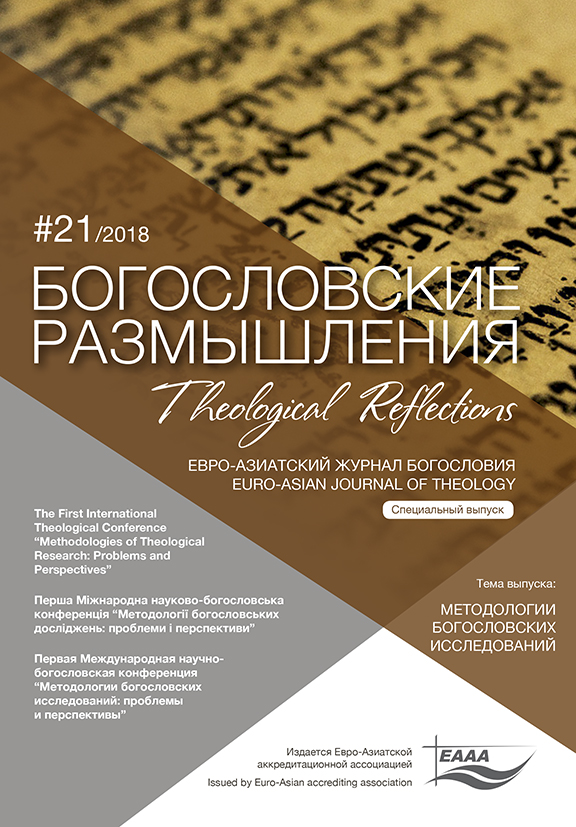Anthropology of Religion as a Bridge between East and West: A Cultural Anthropological Distinction between Intercultural Communication and Worldviews
DOI:
https://doi.org/10.29357/2521-179X.2018.21.8Keywords:
anthropology of religion, cultural communication, cultural differences, religious diversity.Abstract
At the beginning of cultural anthropology in the 19th century it was mainly a Western affair to describe non-Western cultures, and religion was an important phenomenon. In the Structural Functionalism of the mid-20th century (Malinowski, Radcliffe Brown), religion was part of society and could be described in an agnostic way. After the interpretation of man as an actor (Barth, Eriksen), the emphasis came on transactionalism in which man as individual was made responsible for normative interpretation. This ran parallel with the partial disappearance of religion from the Western public domain. The symbolic anthropology in the sixties (Geertz, Turner) brought a connection between the individual variation and the community. This can be summarized in the image that culture and religion is a translation of public symbols, values of orientations and ethos that strengthen collectivities'. The praxis theories in the 1970s to the end of the 20th century (Sahlins, Bourdieu) introduced the element to name ‘events’ as an actor, thereby making clear that culture and religion are not universal concepts but very complex connections that vary per case.
In this discussion we want to review the developments described above and see which elements are useful today in order to be able to understand religion and society in sociological communities and political nations. Anthropology of comparison emerged in the early 21st century (Gingrich & Fox, VanderVeer) to look for new ways to do justice to cultural differences, also from a post-colonial perspective. From my own experience in developing a cultural-comparison model (Boersema, 2004, 2011) we see the possibility for a model where religion is also given a place. This serves to support research on development processes in migrant communities in Western Europe.
Cultural validity attempts to build a bridge between universalism and relativism so there is another possibility to use universal statements in a context that also gives room to the subjective differences that are often the core values of a common identity. This connection is possible by describing cultural behaviour phenomenologically in an etic language (objective) that is linked to recognizable cultural values that can be (subjectively) interpreted in emic language.
By accepting the cultural behaviour associated with cultural norms (convergent), the differences can also be characterized by value (divergent) level, which often shows that it is about priority differences. This can be used when observing religious behaviour (creed, code, cult, community) that can be translated into universal cultural domains (cohesion, hierarchy, diversity, transfer). Observable non-normative values that change on a continuum can be distinguished with values that are connected to a worldview. This explains the difference between intercultural changes and paradigmatic worldview changes which gives a better view on cultural and religious diversity. This method of comparing cultures including the contextualised religions is explained in a case study on christian migrants in Rotterdam. Here we see how a scientific methodology of cultural comparison at the level of the connection 'culture - religion' is possible and gives a foundation for further comparative research by using the same universal values.
References
- Barth, Fredrik (Ed.). Ethnic Groups and Boundaries. The Social Organization of Culture Difference. Long Grove IL: Waveland Press, 1969.
- Boersema, Pieter, Summary and Methodology of the CRVS model (vs. 2017). Academia.edu (CRVS).
- Boersema, Pieter, Unused Talents. A research of the socio-cultural values among Christian migrants in Rotterdam in the context of church, labour and economy. Rotterdam: SKIN, 2016.
- Bourdieu, Pierre. The logic of Practise. Cambridge: Polity Press, 1990.
- Bowie, Fiona. The Anthropology of Religion. An Introduction. Oxford: Blackwell Publishers, 2000.
- Erikson, Erik H. Childhood and society. New York: Norton, 1950.
- Geertz, Clifford. The interpretation of Culture. New York: Basic Books, 1973.
- Gingrich, Andre and Richard Fox (Eds.). Anthropology, by Comparison. London: Routledge, 2002.
- Harris, Marvin. Theories of Culture in Postmodern Times. New York: Altamira Press, 1999.
- Hofstede, Geert. Culture and Organizations, Software of the mind. McGraw Hill, 1991.
- Lambek, Michael (Ed.). A reader in the Anthropology of Religion. Oxford: Blackwell, 2002.
- Malinowski, Bronislaw. Argonauts of the western Pacific. London: Routledge, 1922.
- Ortner, Sherry. Anthropology and Social Theory. Culture, power, and the acting subject. Durham: Duke University Press, 2006.
- Pike, Kenneth. Talk, Thought and Thing. The emic road towards conscious knowledge. Summer Institute of Linguistics, 1992.
- Putnam, Robert (Ed.) Democracies in Flux. The Evolution of Social Capital in Contemporary Society. Oxford: University Press, 2002.
- Radcliffe-Brown, A.R. Method in Social Anthropology. Chicago: The University of Chicago Press, 1958.
- Sahlins, Marshall. How «Natives» Think: About Captain Cook, for Example. Chicago: University of Chicago Press, 1995
- Said, Edward. Culture and Imperialism. New York: Vintage Books, 1993.
- Smart, Ninian. The World’s Religions. Cambridge: University Press, 1989.
- Turner, Victor. The Ritual Process. Structure and Anti-Structure. New York: Aldine De Gruyter, 1969.
- Van der Veer, Peter. The Value of Comparison. London: Duke University Press, 2016.
Downloads
How to Cite
Issue
Section
License
Copyright (c) 2020 Pieter BOERSEMA

This work is licensed under a Creative Commons Attribution-NonCommercial 4.0 International License.
All articles published in the Journal are distributed under a Creative Commons Attribution-NonCommercial 4.0 International License
By submitting an article for publication in Theological Reflections: Eastern European Journal of Theology the author grants the editors the right to publish the article and distribute it in electronic and print form.
The author reserves all copyrights and the right to use the materials of the article in whole or in part for educational purposes, to write his own dissertations, to prepare abstracts, conference reports, oral presentations, etc., as well as post electronic copies of articles (including the final electronic version downloaded from the journal’s official website) on non-commercial web-resources without the consent of the editorial board and founders.



